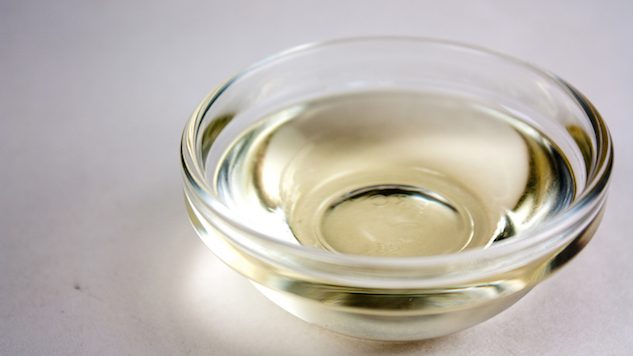
This acronym is just a fancy way to talk about a substance that some people are intentionally consuming for its energy-boosting capabilities.
Type of food: Oil
Name: MCTs, or Medium-chain trigyclerides
Origins: This isn’t so much about the origins of an indigenous food as it is about the dawn of another biohacking trend. Technology entrepreneur Dave Asprey first posted the recipe for his Bulletproof coffee, which involves adding medium-chain triglycerides to coffee, in 2010.
Why/How did we start eating it: Medium-chain triglycerides are fats that are naturally found in coconut and palm kernel oil. Asprey was inspired to create his own riff on this after hiking in Tibet and consuming yak butter in tea. The practice of putting butter in hot drinks is “a several-thousand-year-old practice,” he says.
How it’s used: Asprey’s Bulletproof coffee combines his own proprietary single-origin, sustainable coffee with two tablespoons of grass-fed butter, and one to two tablespoons of his own branded MCT oil, called Brain Octane Oil. It all gets blended together for a roughly 450-calorie drink that he consumes for breakfast.
“It’s the caffeine that actually helps release the fat from the Brain Octane oil and butter into one’s bloodstream so these healthy fats can immediately be used as an energy source. Your body also naturally uses the type of fat found in Brain Octane oil for energy instead of storing it as fat,” he says.
People are using this oil to help support healthy body weight and body composition, along with improvements in brain performance and for quick energy production that comes from a fat not a sugar.
In addition to its healthy fats and creamy taste, butter and ghee (the latter of which many use instead of butter, add other benefits. “Both are filled with essential nutrients including vitamin K2 and butyric acid, which helps promote colon health and brain function. Grass-fed ghee is a great substitute for butter if you are lactose-intolerant,” he says. (Oh, and in case you didn’t now, ghee is a type of clarified butter used frequently in India; most of the milk solids are filtered out.)
How it’s purchased: MCT is commonly purchased as a supplement in oil form at nutrition stores and health food stores. Bulletproof is Asprey’s brand and his oil is called Brain Octane, which is sourced from what he calls “the most potent part of the coconut,” which contains C8, or caprylic acid (there are four types of MCTs in coconut oil.)
There are other brands, too. As a whole food, MCTs are available in coconut oil, palm kernel oil, cheese, butter, ghee, milk and yogurt, in varying concentrations. MCTs are in keeping with a paleo diet’s recommendation, only with even more of an emphasis on fat.
Meredith Maldonado, public relations liaison for the artisanal ghee company Fourth and Heart, says “We get so many unsolicited Instagrammers talking about their love of Fourth and Heart with their coffee for the MCT and the health benefits.” The company sells grass-fed ghee in a variety of flavors—original, white truffle salt, Himalayan pink salt, California garlic and Madagascar Vanilla. She says that the vanilla is especially good in coffee.
Sensory Experience: MCTs on their own are for the most part odorless and unflavored, although that could change.
Nutrition and other benefits: Medium chain triglycerides are more easily and rapidly digested than other types of fats—they don’t need as many enzymes and acids to be absorbed. That seems to be the big calling card here, but there are other benefits, too.
“MCTs go straight to the small intestine where they reach the liver and the liver converts them into ketones, which are an energy source for the brain and body. MCTs are thermogenic and can burn body fat. They are also good for keeping your gut healthy,” says Jamie Logie, a personal trainer and nutritionist with Regained Wellness in Ontario, Canada.
Vincent Pedre, M.D., a New York City-based functional medicine practitioner and author of Happy Gut, recommends them to patients as part of a weight management plan to help people reduce sugar cravings and help keep blood sugar levels stable. “The caprylic acid (C8) component has the most potent antimicrobial activity to keep your gut free of pathogens, while sparing the good gut flora. They also give your body more efficient energy than it can get from glucose (sugar) in carbs. MCT oil can be taken to prolong the ‘fasting’ state in order to promote a healthy gut microbiome environment, without feeling a sugar crash,” he says.
“Patients tend to find it very easy to follow and it does the trick—no more sugar or bread cravings!” he says.
There have been some studies conducted to show how MCTs work with weight loss, but there seem to be some mixed results with this supplement. “I find it helpful energy-wise, not in a major way,” says Logie. “It’s not like caffeine energy—but I feel like it’s a clean energy source.”
Photo by Veganbaking.net, CC BY-SA 2.0
Carrie Havranek is a recovering music critic and part-time baker who writes about food, farmers markets, chefs and restaurants—and sometimes travel—from her home in Easton, Pennsylvania. You may have seen her work elsewhere in Edible Philly, the Kitchn, or Frommer’s.